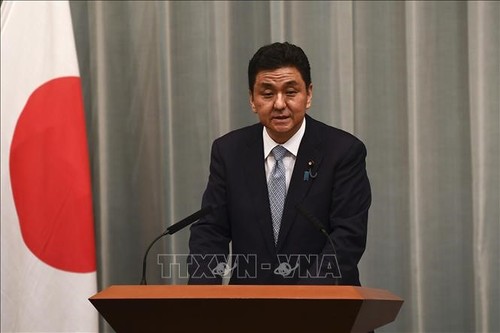 Japan's Defense Minister Nobuo Kishi speaks at a press conference in Tokyo, September 16, 2020 - Photo: AFP/VNA Japan's Defense Minister Nobuo Kishi speaks at a press conference in Tokyo, September 16, 2020 - Photo: AFP/VNA
|
Objections to activities that destabilize or threaten international order
During a phone call on Tuesday, the defense chiefs of Japan and Thailand agreed on the importance of maintaining freedom of navigation. They reaffirmed that Japan's Free and Open Indo-Pacific Vision has similarities with ASEAN’s Outlook on the Indo-Pacific. Japanese Defense Minister Nobuo Kishi and Thai Prime Minister and Defense Minister Prayut Chan-o-Cha voiced their support for respecting the principles stated in the ASEAN Outlook on the Indo-Pacific, including ASEAN's centrality and respect for international law, including the 1982 UN Convention on the Law of the Sea.
Earlier, Japanese officials had separate phone discussions with their Philippine and Australian counterparts on bilateral relations and regional security. They promised to closely cooperate in maintaining regional peace and stability, reiterating their strong opposition to any unilateral actions that might change the status quo in the East Sea or East China Sea or actions that increase tensions.
US President Joe Biden and Republic of Korea President Moon Jae-in issued a joint statement last Friday from the White House, reaffirming their support for ASEAN centrality and the ASEAN-led regional architecture. The joint statement said the US and the Republic of Korea oppose any activities that undermine, destabilize, or threaten international order built on the rule of law, and are committed to maintaining an inclusive, free, and open Indo-Pacific. The two presidents pledged to maintain peace and stability, free and lawful trade and respect for international law, including freedom of navigation and overflight in the East Sea.
Cooperation for peace and stability
The world has protested China’s adoption of its new Marine Police Law in February. Under the new law, the Chinese coast guard is allowed to use hand-held, ship borne or airborne weapons against foreign ships and is allowed to prevent other countries from constructing floating buildings or structures on the reefs and islands claimed by China.
Japan and the Philippines have sent diplomatic notes to the UN, asserting that this law endangers activities that comply with international law in the East Sea. The US, the UK, Germany and some other countries have sent ships to the area.
Claimants of the East Sea, including Brunei, Malaysia, the Philippines, Chinese Taiwan and Vietnam, have all objected to China’s new law, saying the law is one more example of China promoting illegal claims. China's illegal use of force or threats to use force destabilizes and endangers regional peace and security.
The East Sea is one of the world's most vital maritime routes. It has great strategic trade, security, and geopolitical significance. Maintaining peace and stability for their common benefit is the responsibility of all countries. ASEAN’s principled stance on the East Sea is to promote cooperation, dialogue, and trust-building in the region, ensure full and effective implementation of the Declaration on the Conduct of Parties (DOC), and develop an effective and efficient Code of Conduct (COC) in accordance with international law and the 1982 UN Convention on the Law of the Sea.